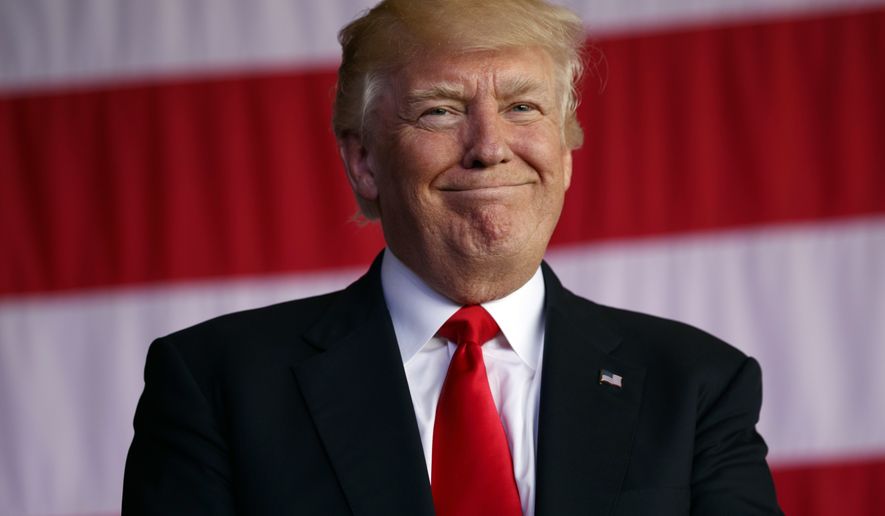Days after he signed a plan to boost spending by nearly $300 billion, President Trump will propose a new 2019 budget his aides said will try to undo some of that increase, in what they called an attempt to “bend the trajectory down.”
White House budget chief Mick Mulvaney said Sunday that Mr. Trump had to pay Democrats “ransom” of more than $100 billion in higher domestic spending in order to win an even bigger increase in Pentagon funding in last week’s budget deal.
But Mr. Mulvaney said Congress should treat the higher spending caps agreed to for 2018 and 2019 as a ceiling, and should actually try to spend less on domestic programs than they can under the deal Congress approved early Friday morning.
“We’re saying, ’Look, you don’t have to spend all of this money,’” Mr. Mulvaney said on “Fox News Sunday.”
The budget Mr. Trump will deliver may be the most irrelevant in history, coming just three days after Congress already approved top-line spending numbers to govern the appropriations bills in 2018 and 2019.
With those numbers in hand, the spending committees can get to work writing the dozen 2018 spending bills — already four months overdue — and get a head start on the 2019 bill, which are due by Sept. 30.
Still, the president’s plan will try to shape the follow-through on Capitol Hill.
Mr. Trump’s 2019 blueprint will ask for $3 billion in new money to fund the border wall, in addition to the $1.6 billion requested but not yet approved for 2018. That’s far less than the $25 billion border wall trust fund Mr. Trump has suggested as part of the immigration debate.
Mr. Mulvaney said their budget will include a contingency should the immigration debate produce a result and the wall be sped up.
Mr. Trump, in the 2019 plan, will also call for a new round of infrastructure spending, asking taxpayers to pony up $200 billion in order to leverage more than $1 trillion from state and local governments and private investors.
The White House said the budget will suggest cuts to the level of domestic spending, but with the realization that Congress is not likely to embrace those. So the White House will also suggest areas to pump the money into, such as anti-opioid efforts and the infrastructure plan.
Mr. Mulvaney and the White House team have some bridge-building to do after last week’s budget votes.
After a brief government shutdown spawned by Sen. Rand Paul’s filibuster, the government reopened on the strength of the Senate’s 71-28 vote and the House’s 240-186 tally.
Conservatives and liberals in both chambers balked at the deal, though for dramatically different reasons.
Democrats, including the party’s leaders in the House, said that while the bill poured tens of billions of dollars into their favored programs, it did not also include a solution for illegal immigrant “Dreamers.”
Immigrant-rights activists had demanded the GOP shut down the government until such a solution was reached.
“Why can’t we extend the hand of friendship and protection to our Dreamers?” House Minority Leader Nancy said as she led opposition to the spending deal.
Conservative Republicans, meanwhile, said the bill marked a capitulation on the principles the GOP had fought for during the Obama administration.
“Tonight, you could feel the frustration and embarrassment growing in Congress as we exposed the hypocrisy of Republicans who are joining in an unholy alliance and spending free-for-all with Democrats at the expense of the American people and our party’s supposed principles,” said Mr. Paul, who staged a filibuster that created a short shutdown early Friday morning.
He had tried to force a vote to restore the strict spending caps to both defense and domestic spending that had produced shrinking deficits and actual cuts to overall government spending earlier this decade.
But Senate Majority Leader Mitch McConnell, Mr. Paul’s Kentucky seat mate, refused to allow a vote to restore the caps.
Mr. McConnell, who struck the spending deal, said it marked a win for all sides. He was trapped between Republican defense hawks, who had insisted on more Pentagon spending no matter what the cost, and deficit hawks who wanted to see more fiscal restraint.
The defense hawks — of whom Mr. Trump is perhaps the leading one — emerged victorious after they sided with Democrats and agreed to increase spending across the board.
Mr. Mulvaney, a former congressman himself, said he probably would have voted against the deal had he still been in Congress, but he said Mr. Trump’s goal of boosting defense spending required such an agreement.
“They held the Defense Department hostage, and we had to pay that ransom,” Mr. Mulvaney said on CBS’s “Face the Nation” program.
Conservatives seemed surprised Mr. Trump was backed into that corner.
“That’s not the choice that many of us on Capitol Hill believed was before us,” said Rep. Mark Meadows, North Carolina Republican.
He said the bill amounted to a 13 percent surge in the size of government.
• David Sherfinski and Bradford Richardson contributed to this article.
• Dave Boyer can be reached at dboyer@washingtontimes.com.
• Stephen Dinan can be reached at sdinan@washingtontimes.com.




Please read our comment policy before commenting.